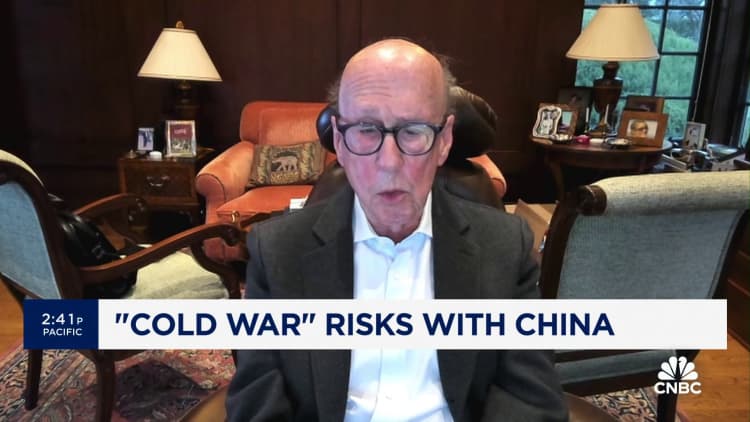
Future discussions between the United States and China will focus on whether Beijing needs to change its industrial and economic policies, U.S. Treasury Secretary Janet Yellen said on Monday as she concluded the fourth and final day of her trip to China on April 8. 2024.
Pedro Pardo | AFP | Getty Images
BEIJING – U.S. Treasury Secretary Janet Yellen said on Monday that future discussions between the United States and China will focus on whether Beijing needs to change its industrial and economic policies.
“We intend to emphasize the need for policy change during these talks – building on the more than two hours of discussions I had with the deputy prime minister on this topic last week,” she said in prepared remarks at a news conference on Monday. This is the fourth and last day of her trip to China.
She arrived in Guangzhou on Thursday and is expected to leave Beijing on Tuesday.
Yellen said Beijing’s economic plans were discussed in her conversations with Chinese officials during her visit, but she did not elaborate. Yellen also declined to say what tools the U.S. might use to prevent China’s industrial policies from causing U.S. job losses.
She noted that U.S.-China dialogue will continue later this month at the Spring Meetings of the International Monetary Fund and World Bank Group in Washington, D.C.

China’s industrial overcapacity – or overproduction of goods that undercut global rivals at prices – has increasingly become a focus of international concern. Other countries claim that such production is often heavily subsidized.
However, Su Yue, chief China economist at the Economist Intelligence Unit, said Beijing’s concerns about oversupply tend to focus on deflation, damage to the health of the banking sector and fiscal pressure on local governments, rather than global trade.
“We expect further countervailing and anti-dumping investigations into China’s manufacturing industry over the remainder of this year, especially as inflation ceases to be a concern in many developed economies,” Su said. “These investigations may expand to China’s overseas factories, including those in ASEAN countries.”
Call for expansion of domestic demand
Asked about potential solutions, Yellen pointed to how China could boost domestic demand relative to supply by increasing support for retirement or children’s education.
High living costs, including housing and health care, encourage many Chinese to save rather than spend.
Yellen acknowledged that efforts to resolve excess industrial capacity or increase domestic demand will not be a quick fix.
“This is an issue we have been discussing in China for more than ten years,” she told reporters.
Consumer demand in China has not rebounded from the epidemic as many analysts expected. Unlike the U.S. and Hong Kong governments, Beijing is not handing out stimulus checks, instead focusing on cutting corporate taxes.
national security talks
Faced with increasing U.S. restrictions on Chinese companies’ access to technology, China has also sought to enhance its technological capabilities.
Both Washington and Beijing are increasingly citing national security as justification for new measures.
Yellen said on Monday that the two sides exchanged messages on using economic tools in national security and should continue to do so. “We promise there will be no surprises,” she said.
During her visit, Yellen met with senior Chinese officials, including Premier Li Qiang in Beijing and Vice Premier He Lifeng in Guangzhou.
“Our bilateral relationship has been on a more stable foundation over the past year,” Yellen said. prepared speech Her meeting with Lee on Sunday.
“This doesn’t mean ignoring our differences or avoiding difficult conversations,” she said. “This means understanding that we can only make progress if we communicate directly and openly with each other.”
Li Keqiang said in a statement issued by China that Beijing hopes the United States will abide by market economic norms and avoid politicizing trade issues. He said that the development of China’s new energy industry will make an important contribution to global carbon neutrality.
According to information released by the Treasury Department after Yellen’s meeting with Vice Premier He, the United States and China agreed to “engage in close communication on balanced domestic and global economic growth.”
The two countries also agreed to “launch joint anti-money laundering cooperation and exchanges between the Ministry of Finance and the People’s Bank of China to expand cooperation in combating illegal finance and financial crimes,” the statement said.
China made no explicit mention of such an agreement but said the two sides planned to maintain communication. Beijing also “expresses serious concern” over U.S. trade restrictions.
China’s briefing called the talks “constructive” and pointed to dialogue on “balanced economic growth,” “financial stability” and “anti-money laundering.” That’s according to CNBC’s translation.
During the visit, the U.S. Treasury Secretary also met with Treasury Secretary Lan Foan, the mayors of Beijing and Guangzhou, representatives of U.S. companies, and teachers and students of Peking University.






